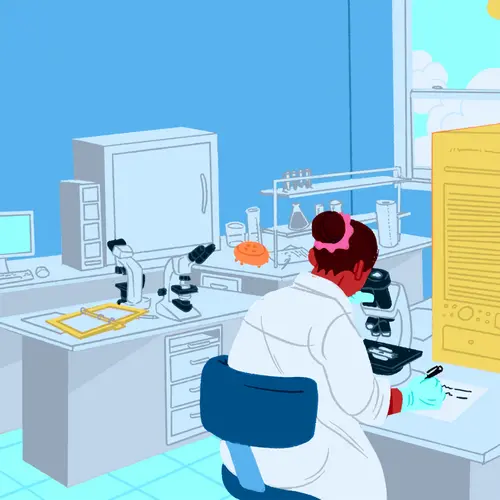Polycythemia vera (PV) causes your bone marrow to make too many red blood cells. You need these cells to carry oxygen around your body, but too many of them can make your blood thicken and form clots. Sometimes blood clots lead to a heart attack or stroke.
Treatments lower the number of red blood cells and prevent blood clots. They also relieve other symptoms, like headaches and vision problems. With the right treatment, you can stay healthy -- and feel better.
Phlebotomy
This is the main PV treatment. It removes some of your blood to get rid of extra red blood cells. It also lowers your red blood cell count, so your blood thickness starts to get closer to normal.
You may get phlebotomy when your doctor first tells you that you have PV. It's a lot like donating blood. The doctor or nurse will put a needle into a vein in your arm and remove a small amount of blood from your body.
The goal is to lower your hematocrit level. Hematocrit is the percentage of red blood cells compared with the total amount of blood.
You'll get this treatment once a week or month until your hematocrit goes down to around 45%. Once your red blood cell level has dropped, you’ll get phlebotomy less often.
Medicines
After your red blood cell level drops, you'll take one of these prescription drugs to slow the production of new red blood cells in your bone marrow.
Hydroxyurea is a cancer drug that slows down the growth of new cells in your body. In PV, it lowers the number of red blood cells and platelets, which are cells that help blood clot. If you take this drug, you may not need phlebotomy. Hydroxyurea can also prevent or treat an enlarged spleen -- a complication of PV.
Hydroxyurea comes in a capsule that you take by mouth. It can cause side effects, such as:
- Nausea
- Vomiting
- Constipation
- Diarrhea
- Rash
It’s very unlikely, but it may cause cells to turn cancerous. Though the risk is very low, your doctor should check you for cancer while you take hydroxyurea.
Interferon-alfa (Intron A) works on your immune system. It targets quickly dividing red blood cells to slow their production.
You take interferon-alfa as a shot just under your skin. Some possible side effects from interferon-alfa are:
- Flu-like symptoms -- fever, chills, and muscle aches
- Tiredness
- Nausea, vomiting
A long-acting version, called peginterferon alfa (Pegasys), has fewer side effects.
Ropeginterferon alfa-2b-njft (Besremi) is the first interferon therapy specifically approved for polycythemia vera. It attaches to interferon alfa/beta receptors (IFNAR), triggering several reactions that cause the bone marrow to produce fewer red blood cells. Administered by injection, it is administered every two weeks.
Some possible side effects include:
- Joint pain
- Flu-like symptoms
- Fatigue
- Itching
- Urinary tract infection
- Depression
- Transient ischemic attacks (stroke-like attacks).
Aspirin thins your blood and prevents clots. It also eases symptoms such as burning in your hands and feet, itching, and bone pain. Your doctor might recommend that you take a low dose of aspirin every day.
Daily aspirin use has some risks. It can make bleeding more likely, especially in the stomach and other parts of your digestive system. Talk to your doctor about these and other risks before you start to take aspirin regularly.
Your doctor may also consider other treatments such as anagrelide, busulfan (Myleran), imatinib (Gleevec), and ruxolitinib (Jakafi). These medicines help certain types of blood cells work better, so your blood flow improves and is less thick. They might be an option if other treatments don’t work or if you can't take drugs like hydroxyurea and interferon-alfa. Each drug is different, so your doctor will talk with you about side effects and what the latest research shows.
Radiation Therapy
This treatment slows red blood cell production in bone marrow, which thins your blood and helps it flow more easily. Yet doctors don't use radiation therapy very often for PV because it also can make blood cancer (leukemia) more likely.
To Feel Better During Treatment
In addition to your medical plan, use these self-care tips to help you feel better:
- Exercise daily. Staying active will help keep your blood flowing and prevent clots. Also stretch regularly -- especially your legs and ankles -- to improve blood flow.
- Take cool baths to prevent skin irritation. Gently pat yourself dry afterward -- don't rub your skin.
- Keep warm. PV affects your blood flow, which can cause you to lose heat in your hands and feet. Wear gloves and socks when it's cold outside.
- Drink a lot of water. Extra fluids will help prevent your blood from getting too thick.
- Try not to hurt your feet. Wear shoes to protect against skin damage. Check your feet often for any cuts or sores.
- Treat itchy skin. Moisturize or use an over-the-counter antihistamine.
- Shield your skin from the sun. Apply an SPF 30 or higher sunscreen every time you go outside. Also wear sun-protective clothing, including a wide-brimmed hat.
It’s normal to have a mix of emotions when you have a serious condition. If your concerns start to worry you or get you down, talk to your doctor, a therapist or counselor, or a support group. Let close friends or family members know what you’re going through and how they can help.

